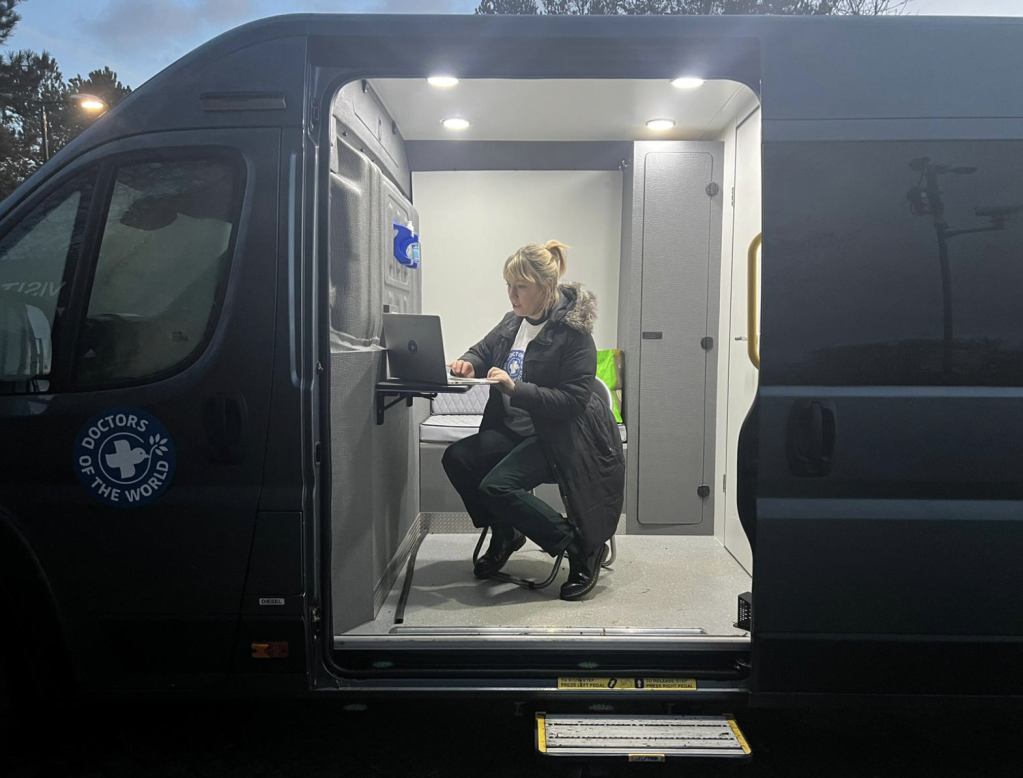Rights activists warn that data-sharing protocols promote surveillance and discrimination against migrants. In the case of the healthcare system, this could result in delayed or denied help. Undocumented migrants would be particularly hardest hit.
Plans for a new digital tag in British NHS (National Health Service --the UK's public health service) records for overseas patients have raised concerns among doctors, privacy advocates, and migrant rights campaigners, the British newspaper The Guardian reported on Saturday (October 12).
The proposed "Overseas Visitor Charging" category would allow the Department of Health and Social Care (DHSC) to monitor hospital charges for those who access the health service and come from overseas, which could include migrants. The proposal was passed on to the newly elected Labour government from its Conservative predecessor.
"Plans for a digital tag on NHS records will further isolate undocumented migrants and prevent them from accessing vital healthcare. The new Government has a chance to undo the previous administration's harmful data-sharing agreements which signaled greater surveillance of migrants and an erosion of their privacy," Fizza Querishi, chief executive officer of the Migrants' Rights Network told InfoMigrants.
Health data privacy campaigner, medConfidential, raised similar concerns.
"Every use of health data should be consensual, safe, and transparent. The hostile environment of the immigration department is entirely incompatible with good health care," Sam Smith, coordinator of medConfidential told InfoMigrants.
Read AlsoUK: 'Sold a pipe dream?' How thousands of care workers risk deportation after paying for visas
Free medical services for residents
A Department of Health and Social Care (DHSC) spokesperson in an email to InfoMigrants explained, "It is right that overseas visitors and those who are not lawfully settled here contribute towards their treatment costs, as our health service is a residency-based system."
The spokesperson clarified that services provided by the National Health Service (NHS) are free for people considered "ordinarily resident" in the UK.
"The government has to plan for its proper funding and those resources need to be protected for their intended purpose. It is reasonable for the government to prioritize its resident citizens in terms of public funds and services. However, it also recognizes its duty to take care of visitors' health needs while they are here," said the DHSC spokesperson.
Apart from British nationals and those with legal residence in the UK, NHS medical services are also free for other groups such as asylum seekers, victims of modern slavery, and victims of domestic abuse.
Undocumented migrants in a medical access grey zone
Rights groups warned that this leaves other migrant groups such as those who are undocumented to fall through the cracks. An undocumented migrant is defined as a person living in the UK but does not have a valid visa or legal documentation certifying their residence status.
Undocumented migrants are prohibited from accessing social services, including anything other than basic or emergency public healthcare.

While an official count of undocumented migrants is notoriously difficult to ascertain, a compilation by Oxford University's Migration Observatory of the most recent data indicates that the numbers range from a low of 594,000 to a high of 1.3 million undocumented migrants.
The Joint Council for the Welfare of Migrants estimates that about 215,000 undocumented people are children.
Read AlsoWhy immigration is a major issue in the UK election
Impact of migration status and access to health care
Doctors of the World, an international humanitarian organization that provides healthcare to people in vulnerable situations, warned that this data-sharing arrangement will further erode people's trust in the UK healthcare system.
"We already struggle to assure our patients that it is safe for them to go to the hospital. This proposed change will mean we cannot reassure patients that medical confidentiality will be maintained and protected, and their private, clinical information stays between them and their doctor," Anna Miller, head of Policy and Advocacy for Doctors of the World, told InfoMigrants.

Miller further explained that these policies have a profound and lingering impact on seeking health care and can often result in delayed diagnosis and treatment.
"Our clinic doctors and health workers see people in need of medical care who are too afraid to go to health services. They fear they will be charged for treatment and reported to the Home Office for immigration enforcement," said Anna Miller, head of Policy and Advocacy for Doctors of the World.
"When our patients do go forward for medical care, often they are turned away without an assessment of the urgency of their medical need," Miller added, emphasizing that these fears, especially among those with an irregular migration status, are not unfounded.
Government policy requires hospitals to bill patients without formal immigration status the cost of any treatment. If the bill for medical services is over 500 pounds (around 600 euros) and is not paid within two months, the patient is fined an additional 50 percent and reported to the Home Office (Interior Ministry).
"This amount of money is completely inaccessible for many of our patients and people living in the UK," said Miller.
Read AlsoForeign nurses leaving UK for better pay and conditions
Medical debt
As explained by the DHSC, where a patient needs chargeable, non-urgent medical care, doctors are not meant to proceed without full payment being made in advance. Equally, urgent treatment must not be withheld or delayed, pending payment.
"What is considered urgent or non-urgent is a clinical decision and will depend on when the patient is reasonably expected to depart the UK,” said the DHSC spokesperson.
The medical expense may be waived if the person does not have the financial capacity to pay, but medical debt is not erased and remains on government records and may resurface if the patient's capacity to pay changes.
"Where a patient who has received services is identified as chargeable the NHS trust responsible for administrating that hospital or clinic must invoice the patient and make every effort to recover those charges," said the DHSC spokesperson.
Doctors of the World clinic data indicated that on average, patients without immigration status in need of secondary care experienced 37 weeks of delay in receiving treatment. In almost 60 percent of the cases, the medical service withheld was classified as 'urgent' care.
"The policy to fine and report migrants for accessing medical care should be abolished. This would remove the need for murky data-sharing arrangements and ensure medical confidentially for all patients. Ultimately, access to medical care should be based on medical need, not ability to pay for immigration status," said Miller.
